- Home
- Robert Muchamore
Henderson’s Boys 4: Grey Wolves Page 2
Henderson’s Boys 4: Grey Wolves Read online
Page 2
‘You’ll get a good spanking for that,’ he growled happily.
As Gerhardt forced the girl back inside. Henderson landed a knockout blow with the edge of his pistol. The girl screamed as Gerhardt toppled sideways. Henderson turned back to Marc and spoke in English. ‘Get our luggage in and shut the door.’
The pill-box was lit with a single, tiny gas lantern. The floor was scattered with clothes and wine bottles. The terrified girl was a teenager, half dressed and shorter than Marc. She scooped up her dress before Henderson put a hand behind her neck and spun her body around to face the wall.
‘Do not look at me,’ Henderson warned, speaking in French now, but adding an over-the-top English accent. ‘If you can identify me I’ll have to kill you.’
Gerhardt was unconscious, but he was a big beast. Henderson didn’t want him getting up, so he reached into a small pocket hidden behind his trouser belt and removed a deadly cyanide pill.
Pinching the nose forced Gerhardt’s mouth open. Henderson caught a blast of foul breath as he crumbled the pill on to the German’s tongue and clamped his jaw shut.
After a moment the hairy body began a series of violent convulsions. As Henderson stepped away, he saw the girl move slightly and shoved her face back against the wall.
‘Do you really want to die young?’ he asked.
Marc threw the backpack through the doorway before pulling the metal door shut and sliding the bolt. He could barely see his hand in front of his face.
‘Not one word,’ Henderson told Marc, jamming two fingers down the dying German’s throat.
His gag reflex was still active and red-wine-coloured vomit shot up Henderson’s arm before spattering the floor. Henderson tried not to breathe as he rolled the big German on to his chest and carefully positioned his face in the vile-smelling pool. It was an unpleasant business, but Gerhardt now looked like a man who’d passed out drunk and choked on his own sick. It was unlikely that any doctor would investigate further.
‘Gather up the Captain’s things and check his documents,’ Henderson told Marc. ‘Take his jacket and nothing else. It can’t look like he’s been robbed.’
‘Is he dead?’ the girl asked, as Henderson stepped up behind her.
‘Very much so,’ Henderson said, keeping his tone friendly, but deliberately breathing down her bare back. She was more likely to be honest if she was intimidated.
The girl tipped her head back and sobbed.
‘I’m going to ask questions,’ Henderson said, piling on the English accent. ‘I’ll start with a simple one, your name?’
‘Delphine.’
‘Delphine, that’s nice. Now where am I?’
Delphine seemed confused. ‘How can you not know?’
Henderson jabbed a finger between Delphine’s shoulder blades as Marc read Gerhardt’s identity document.
‘You don’t ask questions. You answer them, and quickly.’
‘We’re at Lamor Plage,’ Delphine said, and then with a touch of sarcasm, ‘Do you know where that is?’
Kapitan Maximillian Gerhardt, Kriegsmarine1, Underseaboat Section, Marc read to himself. Commissioned 1932. There were photos, hard to make out in the gloom: a wife, a child sitting cross-legged with the family dog. The final picture was in colour and showed forty-eight men on the deck of a U-boat, with a pennant marked U27 and Gerhardt at the centre of it all.
Marc smiled. If they were shot dead now, they had at least accomplished something by blundering in and murdering a U-boat captain. Henderson was also satisfied: Lamor Plage was less than two kilometres from their intended landing beach and closer to their target. It was all good, provided they could make it out of here alive.
‘What’s the house?’ Henderson said. ‘What’s it used for?’
‘It was the beach house of Madame Richard. She cleared off before the invasion and now it’s quarters for senior naval officers.’
‘And what brings you here?’
‘It’s a party for the Führer’s birthday.’
‘Is that today?’ Henderson laughed. ‘Sorry, Adolf, I forgot to mail your card! So tell me, Delphine, do you enjoy sleeping with Germans?’
‘My mother hates me coming here, but there’s good food and they’ve always been very correct. At least until tonight when that great pig dragged me away and ripped my dress off.’
Marc studied Delphine as he brushed sand off his clothes. She had muddy feet and scratches up her legs where she’d been dragged through the reeds. She was clearly telling the truth, or something close to it.
‘Do you know this area well?’ Henderson asked.
‘A little,’ Delphine said. ‘I live in Lorient. Twenty minutes’ walk from here.’
‘Is there a security perimeter around the house?’
‘There’s no gate,’ Delphine said. ‘But there’s a checkpoint up where you turn off the main coast road.’
‘How far away is that?’
‘Two or three hundred metres.’
‘And between here and Lorient, how many checkpoints?’
‘On every road into the city, all around near the submarine base. Snap checkpoints can go up anywhere at any time, but not usually after curfew.’
‘Thank you,’ Henderson said. ‘That’s useful to know.’
‘Are you a British agent?’ Delphine asked. ‘Because you need to be careful. I don’t mean to be rude, but your accent is a terrible giveaway.’
Marc stifled a laugh.
‘I’ll let my wife do the talking then,’ Henderson said, hoping to throw Delphine even further off the scent by implying that Marc – who she’d barely seen in the darkness – was a woman rather than a boy. ‘Now I’m sure you’re trustworthy, maybe you’re grateful that I saved you from that big hairy Kraut, but you were out here partying with the enemy. You might run back to the house screaming blue murder the second I’m out of the door. So I’m rather afraid we’re going to have to give you a little pill.’
‘Please,’ Delphine sobbed, as she writhed desperately. ‘I don’t want to die. I might even be able to help you.’
Henderson laughed. ‘Not one of the deadly ones, sweetie! It’ll just put you under for three or four hours. Bit of a nasty headache when you come around. If the Germans ask, tell them you passed out drunk and can’t remember a thing.’
Note
1 Kriegsmarine – the official name of the German Navy during the Nazi era.
CHAPTER THREE
After drugging Delphine, Marc and Henderson braved the back lawn around the grand house, cutting between partying naval officers with darkness working in their favour. Henderson wore Gerhardt’s giant captain’s jacket and howled a Bavarian folk song, while Marc exchanged Heil Hitlers with an Oberlieutenant rolling around the shrubbery with a champagne bottle wedged down his trousers.
To avoid the checkpoint by the main road, the pair climbed a stile and crossed a couple of untended fields before hitting a dirt track, aiming roughly towards the small naval town of Lorient.
Marc and Henderson had operated in occupied France the previous year, and knew that German forces were spread thin, even in high-security zones near the coast. This was unavoidable: the Germans had conquered half a continent and there weren’t enough of them to go around.
But millions of French civilians had evacuated south when Hitler invaded the previous summer, and one way of reducing trouble in the northern coastal zones was to keep the population down by not letting refugees return.
The result was untended land and houses left to rot through the past winter. It was a nightmare for people who wanted to get home, but a godsend for Marc and Henderson who needed a bolthole where they could hide some of their equipment, and transform their appearance from sandy new arrivals to a respectable French father and son, down on their luck and hunting for work.
They skirted around two villages at a brisk pace before finding a suitably remote farmhouse. Its unoccupied state was obvious from the empty chicken coop and overgrown lawn. The back door didn
’t need forcing because thieves had already ransacked the place.
What they’d taken reflected severe shortages France had suffered that winter. Glass candlesticks and figurines stood unmolested on a window ledge, metal pans hung over the kitchen range, but there wasn’t a tin of food, nor a coal in the fireplace. Anything you could chop and burn had been stripped out: curtains, doors, bedding. Only splinters and hinges remained from a kitchen dresser.
‘Cold and hungry thieves,’ Henderson said, as he turned the kitchen tap.
After a dead moth and some sediment came cleanish water. Marc had found the stub of a candle. He struck a match and placed the flickering light under the dining table so that it wouldn’t be obvious from outside.
‘How’s the foot?’ Henderson asked.
‘Ankle’s swollen up,’ Marc said. ‘Doesn’t hurt much though.’
‘Salt in seawater is a natural antiseptic,’ Henderson said. ‘Once you’ve had a wash I’ll put some iodine on the wound and bandage it. Then you can get a few hours’ rest.’
‘What are we gonna do without the transmitter?’ Marc asked, as he sat on a dining chair, unlacing his plimsoll.
‘We have our fall-back rendezvous aboard Madeline tomorrow night,’ Henderson said.
‘But we lost the canoe,’ Marc said, as he pulled off his plimsoll, getting a damp rubbery smell and a shot of pain up his leg. ‘And that idiot Rufus dropped us off at the wrong beach, so what are the chances they’ll be at the right area when it’s time to pick us up?’
‘We’ve got time to think it all through,’ Henderson said. ‘If we get stuck, we’ll have to go south and try getting over the mountains into Spain. There are always options. In this game the only certainty is that things won’t go to plan.’
*
Straw and a sleeping bag on the kitchen floor was paradise compared to the previous two nights aboard Madeline. The old tug offered a choice between a sodden rear deck, or the cramped triple bunk below deck next to the heat and racket from the steam boiler. Marc had tried both and slept in neither.
Nerves and pain made it hard to get to sleep, but once he’d won that battle, Marc was out until morning. The new day had a good feel to it, with a clear sky and warm air. He’d washed before bed, so he felt clean and cosy, and didn’t want to get up as he picked sleep out of his eyes.
Henderson’s sleeping bag was laid out on the opposite side of the dining table, but he was already up.
‘Still alive then?’ Henderson said, stepping in from the back yard where he’d been banging the sand out of his boots. ‘I’ve made every boy’s favourite breakfast.’
Marc’s bandaged ankle had bled overnight. Clotting blood had glued the bandage to the sleeping bag, but the pain was tolerable as he stood up. He scratched himself, and smiled when he saw a slab of high-energy chocolate and a small tin of condensed milk.
‘I’ve put most of our reserve equipment up in the loft,’ Henderson explained. ‘We’ll come back if we need it.’
‘What if the thieves come back?’ Marc asked.
‘There’s plenty of wood to strip out on this floor. It’ll be all right here for a day or so.’
Marc’s chocolate was rock hard and he warmed it in his hand before dipping it into the gloopy strands of thickened milk. Condensed milk was a rare luxury and he loved chocolate, but it made heavy going first thing in the morning.
‘Eat up, it might be all you get today,’ Henderson said. ‘We’ve got a couple of fake ration cards but even if they’re the right kind I doubt there’ll be much in the shops.’
‘I never get my appetite until I’ve been up for a bit,’ Marc said. ‘I checked Delphine’s documents while you were interrogating her, by the way. Her ID and tobacco card looked exactly like our fakes, but her bicycle permit and ration card were different colours and she had an extra document that looked like it was specific to this area.’
‘It’ll be tricky getting into town to photograph the U-boats,’ Henderson said, as he looked inside his boot before shaking out more sand. ‘But Madame Mercier lives on the outskirts. We can get to her if she’s home, and she might know a sneaky way into town.’
‘That’s if she’s still living at the same address,’ Marc said.
Henderson smiled. ‘It’s your bloody optimism that keeps me going, Marc. Now start getting dressed. Those plimsolls are horribly bloody and sure to raise questions. Can you walk barefoot?’
‘I’ve lived the high life since I arrived in England, but I’ve been a barefoot orphan most of my life.’
They set off after Marc had dressed and taken a shit, Henderson carrying a flour sack filled with a few clothes and possessions to make it look like he was nothing but a poor peasant looking for work. Marc took a small hunting-knife, which wasn’t unusual for a country boy, while Henderson had a small camera hidden in the lining of his hat and his pistol tucked into the back of his trousers.
The gun was a risk. It meant certain arrest if they were searched at a German checkpoint, but Henderson didn’t want to go unarmed until he was sure they had all the correct passes and documents.
Henderson knew where they’d landed the previous night, and roughly how far and in which direction they’d walked, but it still took a while to work out exactly where they’d wandered in the dark. They moved cautiously, not wanting to blunder on to a major road, or worse, a German checkpoint.
The sun was bright and they both had a sweat up by the time they reached their target in Queven, a prosperous settlement less than two kilometres from Lorient itself. Madame Mercier lived on a curving street lined with detached villas, the kind of place you’d expect a doctor or lawyer to live with his family.
Marc and Henderson felt out of place here in their peasant corduroys and rough shirts. They noted parked cars and telephone wires going into the villas, neither being a good sign because only Germans were allowed to have them.
An agent approaching a strange house must strike a balance. You can blunder into a trap if you don’t scout an area carefully, but walking around several times, peeking over hedges and looking through letterboxes, can arouse suspicions of nosy neighbours or passing cyclists.
Number eighteen sat behind high railings, with palms sprouting over the top. Alongside the villa a bare-chested man chopped firewood. At first they assumed he was a servant, but his boots had sheen, and his grey trousers were those of a shore-based Kriegsmarine rating.
Henderson gave Marc a little keep walking nudge, but the German had seen them peer through. He looked up and spoke bad French.
‘Good morning, may I help you?’
‘I’m looking for a Madame Mercier,’ Henderson said, trying to make it sound unimportant. ‘She used to live here, I believe.’
‘She upstairs. You want?’ the German said, as he stepped towards the gate to let them in while shouting, ‘Madame, there is a persons here to see you.’
‘Charles Hortefeux,’ Henderson said, as the front door opened.
The woman who emerged on to the front doorstep was large in all directions, and looked like she’d been up late the night before. She wore a turquoise negligee, with the previous day’s make-up blurred over her face and the short stubbly hair of a lady who was not usually seen without a wig.
‘I don’t know any Hortefeux,’ the woman blasted, as she eyed the man and barefoot boy with contempt. ‘And I don’t need gardeners, window washers, or whatever other scheme you have to part me from my money.’
Henderson was prepared for a difficult introduction to Madame Mercier, but having the young German gawping at them from only a couple of metres away made it far worse.
‘Well, Madame, if you’re sure,’ Henderson said, as he pulled a small photograph out of his pocket. It showed three men, with Big Ben in the background. ‘Can I just leave you with this business card, in case you change your mind?’
‘If it gets rid of you,’ Madame Mercier said, snatching the photo, but becoming flustered when she recognised the three men. They were Polish soldi
ers, whom she’d helped to escape from France a few months earlier.
‘Oh, Mr Hortefeux,’ she said, after a pause. She pointed accusingly at the German. ‘Klaus, your accent is terrible! I thought you said Hautedeux. Well come in, how the devil have you been? Is this your son, all grown up now?’
The hallway had billowing rose curtains, china poodles, ship’s bells, stuffed flamingos, a collection of cocktail shakers and the head of an ocelot. Marc choked on talc, perfume and cat.
‘Is it private here?’ Henderson asked quietly. ‘Are any other Germans billeted in your house?’
Madame Mercier laughed, as she led them into a similarly over-the-top lounge with an evil-looking moggy skulking by the back window.
‘Klaus doesn’t live with me. I have an arrangement with a very senior officer. He’s fallen for one of my best girls, but can’t afford her prices. Instead he sends someone over, to mow the lawn and chop wood and suchlike, which is a good arrangement because it’s impossible to get a man in for anything these days.’
‘So the Germans didn’t shut your business down, Madame Mercier?’ Henderson asked, smiling coyly.
‘Do call me Brigitte,’ she said, peering through the windows to make sure that Klaus had gone back to chopping. ‘The uniforms may change, but men’s urges stay the same: cheap booze and easy women. Lorient has always been a navy town. The French and British shipped out and my clubs and bars were full of Germans within a fortnight. I’ve got places all along the main drag in town. Three upmarket ones reserved for the Krauts; the other three are for locals and the construction teams working on the U-boat bunkers.’
‘Quite a little empire,’ Henderson nodded. ‘Would you like to know about your three former employees? Soloman was kind enough to write a letter of introduction for me; though I’m afraid it got rather soggy.’
But Madame Mercier had turned her attention to Marc, pinching his right cheek and yanking his head up.
‘Is he your son, Mr Hortefeux? Lovely strong shoulders on him. I bet he’ll break some hearts when he’s older!’
Marc felt like he was being attacked by a powder puff as Henderson fought off laughter.

 Brigands M.C.
Brigands M.C. Home
Home The General
The General New Guard
New Guard Lone Wolf
Lone Wolf Cherub: Guardian Angel: Book 14
Cherub: Guardian Angel: Book 14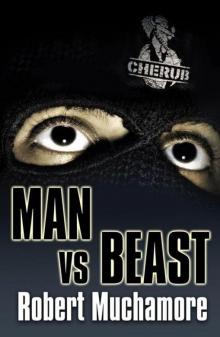 Man vs. Beast
Man vs. Beast The Escape
The Escape Secret Army
Secret Army Henderson's Boys: Eagle Day: Book 2
Henderson's Boys: Eagle Day: Book 2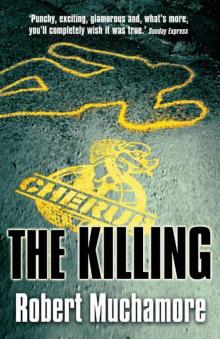 The Killing
The Killing Divine Madness
Divine Madness Class A
Class A The Sleepwalker
The Sleepwalker Henderson's Boys: Grey Wolves
Henderson's Boys: Grey Wolves Henderson's Boys: One Shot Kill: One Shot Kill
Henderson's Boys: One Shot Kill: One Shot Kill Maximum Security
Maximum Security The Prisoner
The Prisoner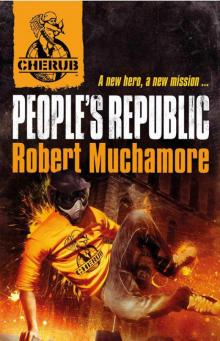 People's Republic
People's Republic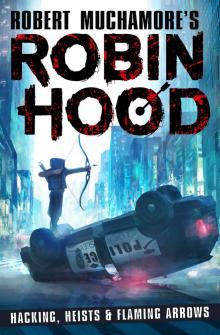 Robin Hood: Hacking, Heists and Flaming Arrows
Robin Hood: Hacking, Heists and Flaming Arrows Shadow Wave
Shadow Wave Mad Dogs
Mad Dogs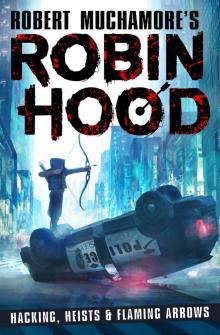 Robin Hood
Robin Hood Robin Hood 2
Robin Hood 2 KILLER T
KILLER T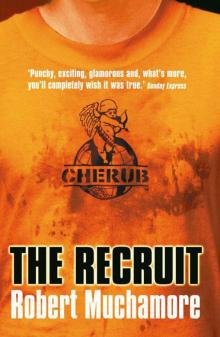 The Recruit
The Recruit Henderson's Boys: Scorched Earth
Henderson's Boys: Scorched Earth The Fall
The Fall Jet Skis, Swamps & Smugglers
Jet Skis, Swamps & Smugglers Black Friday
Black Friday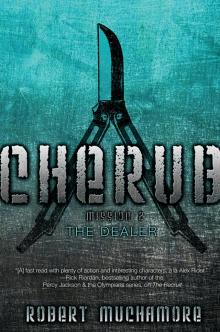 The Dealer
The Dealer CHERUB: Mad Dogs
CHERUB: Mad Dogs Scorched Earth
Scorched Earth Henderson's Boys: Eagle Day
Henderson's Boys: Eagle Day CHERUB: Brigands M.C.
CHERUB: Brigands M.C. CHERUB: Guardian Angel
CHERUB: Guardian Angel CHERUB: The Sleepwalker
CHERUB: The Sleepwalker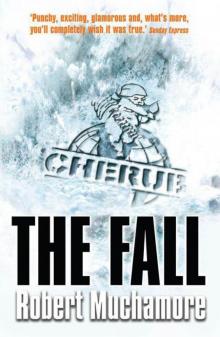 CHERUB: The Fall
CHERUB: The Fall Henderson's Boys: Secret Army
Henderson's Boys: Secret Army CHERUB: Dark Sun
CHERUB: Dark Sun CHERUB: Divine Madness
CHERUB: Divine Madness CHERUB: The General
CHERUB: The General New Guard (CHERUB)
New Guard (CHERUB) CHERUB: Shadow Wave
CHERUB: Shadow Wave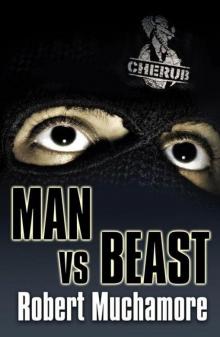 CHERUB: Man vs Beast
CHERUB: Man vs Beast CHERUB: Class A
CHERUB: Class A Henderson’s Boys 4: Grey Wolves
Henderson’s Boys 4: Grey Wolves CHERUB: Maximum Security
CHERUB: Maximum Security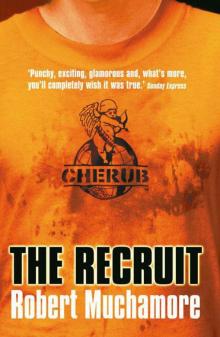 CHERUB: The Recruit
CHERUB: The Recruit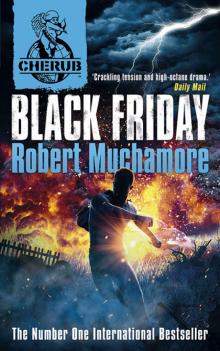 CHERUB: Black Friday
CHERUB: Black Friday One Shot Kill
One Shot Kill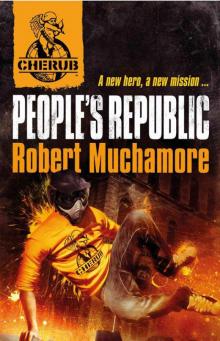 CHERUB: People's Republic
CHERUB: People's Republic